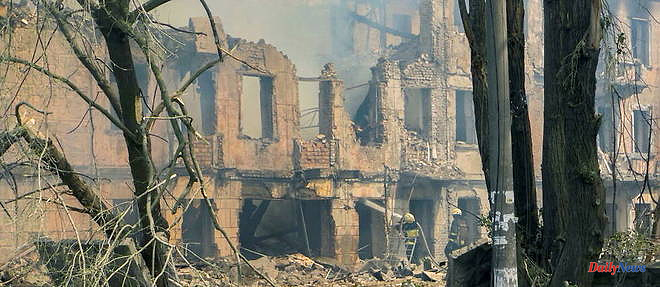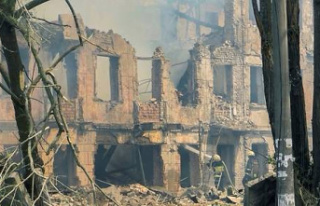Another burst of fire, in Ukraine. In Dnieper, Russian missile fire hit a clinic, killing at least two people. Ukrainian President Volodymyr Zelensky blasted the act, calling it a "crime against humanity".
For its part, Russia announced that it had suffered Ukrainian bombardments on the Russian border region of Belgorod, for the fifth day in a row. This region had already been targeted earlier this week during an incursion by armed fighters from Ukraine, as well as a drone strike in Krasnodar, 200 kilometers from Crimea.
"There are 23 wounded in the Dnieper," Governor Serguii Lyssak said, adding that two men were also killed. The Ukrainian president has published images on which we can see buildings badly damaged and topped with plumes of black smoke. Other videos show rescuers helping people with bloody faces escape the clinic through rubble-filled corridors.
"A new Russian missile attack, a new crime against humanity", denounced Volodymyr Zelensky. According to the first lady, Olena Zelenska, it was a clinic for psychiatric care. According to Governor Serguii Lyssak, his region was "massively attacked" during the night "with missiles and drones".
Kyiv Municipality also reported overnight the 13th Russian airstrike on the capital since early May, this time with cruise missiles launched by Tu-95MS strategic bombers from the sea region. Caspian. "According to preliminary information, all enemy targets in kyiv airspace have been detected and destroyed," she added.
Across the country, the Ukrainian General Staff reported 55 Russian air attacks, one of which notably damaged a dam in the eastern region of Donetsk, posing "great danger of flooding" of the area.
The Russian military has confirmed that it carried out night strikes on Ukraine, claiming to have targeted "ammunition storage sites" and to have "hit all designated sites".
Moscow also reported Ukrainian bombardments on a Russian border region, for the fifth day in a row. The Belgorod region has suffered dozens of artillery fires in the past 24 hours, according to Governor Vyacheslav Gladkov, which caused material damage without causing casualties. These shots notably targeted the village of Kozinka, in the district of Graivoron, where an incursion by armed fighters from Ukraine had taken place at the start of the week. The village was hit by 132 shells, according to the governor.
The Belgorodsky district, which surrounds the regional capital Belgorod, was hit by 14 shots, including from drones, one of which dropped a bomb on an administrative building, damaging its roof and shattering the windows.
In Krasnodar, a city of more than 1 million people in southern Russia, buildings were damaged by the strike of two drones, which caused no casualties.
These bombardments take place while Ukraine says it has been preparing for months a major counter-offensive intended to repel Russian troops, after having received multiple deliveries of Western weapons.
In this context, Russian diplomacy "strongly protested" to the US embassy against "unacceptable statements" by Joe Biden's national security adviser, Jake Sullivan, whom it accused of "approving" Ukrainian strikes against Russian territory.
On Monday, two armed groups fighting for Ukraine and claiming to be Russian attacked the border region of Belgorod, the most serious incursion of this type since the start of the war. While the Russian army claimed to have killed nearly 70 "Ukrainian terrorists" using artillery and air force, the two groups, whose members are linked to the Russian far right, did not only two dead and ten wounded in their ranks.
Another source of tension, Belarus, an ally of Moscow, said Thursday evening that Russia had begun to deploy nuclear weapons on its territory, in accordance with an announcement made in March by Vladimir Putin. Kremlin spokesman Dmitry Peskov did not confirm the reports on Friday, only pointing out that Belarus "is facing unfriendly, even hostile attitudes from neighboring countries". “We must therefore continue to develop and strengthen our relations with our allies […], including in the military field,” he added.












